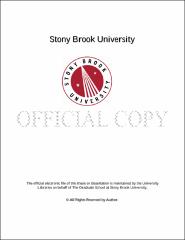| dc.identifier.uri | http://hdl.handle.net/11401/76894 | |
| dc.description.sponsorship | This work is sponsored by the Stony Brook University Graduate School in compliance with the requirements for completion of degree. | en_US |
| dc.format | Monograph | |
| dc.format.medium | Electronic Resource | en_US |
| dc.language.iso | en_US | |
| dc.publisher | The Graduate School, Stony Brook University: Stony Brook, NY. | |
| dc.type | Thesis | |
| dcterms.abstract | Insulin Like Growth Factor 1 Receptor (IGF1R) is a receptor tyrosine kinase that functions to control cell proliferation and apoptosis. Activation occurs upon the binding of the IGF1 ligand to the extracellular domain facilitating trans-autophosphorylation and thus activation. The receptor activates downstream signaling through both the MAPK and PI3K/Akt pathways that contribute to cellular proliferation and preventing cell death, respectively. IGF1R is overexpressed and hyperactive in many human cancers. We postulated that IGF1R could also be activated by mutation. We further hypothesized that particular C-terminal mutations could affect the ability of this domain to autoregulate the receptor. Mutations were chosen from the Catalog of Somatic Mutations in Cancer (COSMIC) database based on their location in C-terminal domain of the receptor and prevalence in various cancer patients. We conducted mutagenesis on the wild type IGF1R receptor to create four mutant constructs that were studied in vitro using R- (IGF1R-/-) mouse fibroblast cells. Following IGF1 stimulation the cells were harvested, the receptor immunoprecipitated, and kinase activity was studied using SDS-PAGE and western blot analysis. We found that the cancer associated mutations chosen did not affect the receptor’s tyrosine kinase activity. | |
| dcterms.abstract | Insulin Like Growth Factor 1 Receptor (IGF1R) is a receptor tyrosine kinase that functions to control cell proliferation and apoptosis. Activation occurs upon the binding of the IGF1 ligand to the extracellular domain facilitating trans-autophosphorylation and thus activation. The receptor activates downstream signaling through both the MAPK and PI3K/Akt pathways that contribute to cellular proliferation and preventing cell death, respectively. IGF1R is overexpressed and hyperactive in many human cancers. We postulated that IGF1R could also be activated by mutation. We further hypothesized that particular C-terminal mutations could affect the ability of this domain to autoregulate the receptor. Mutations were chosen from the Catalog of Somatic Mutations in Cancer (COSMIC) database based on their location in C-terminal domain of the receptor and prevalence in various cancer patients. We conducted mutagenesis on the wild type IGF1R receptor to create four mutant constructs that were studied in vitro using R- (IGF1R-/-) mouse fibroblast cells. Following IGF1 stimulation the cells were harvested, the receptor immunoprecipitated, and kinase activity was studied using SDS-PAGE and western blot analysis. We found that the cancer associated mutations chosen did not affect the receptor’s tyrosine kinase activity. | |
| dcterms.available | 2017-09-20T16:51:23Z | |
| dcterms.contributor | Miller, W. Todd | en_US |
| dcterms.contributor | El-Maghrabi, M. Raafat. | en_US |
| dcterms.creator | Pappalardo, Christa Nicole | |
| dcterms.dateAccepted | 2017-09-20T16:51:23Z | |
| dcterms.dateSubmitted | 2017-09-20T16:51:23Z | |
| dcterms.description | Department of Biochemistry and Cell Biology | en_US |
| dcterms.extent | 23 pg. | en_US |
| dcterms.format | Application/PDF | en_US |
| dcterms.format | Monograph | |
| dcterms.identifier | http://hdl.handle.net/11401/76894 | |
| dcterms.issued | 2016-12-01 | |
| dcterms.language | en_US | |
| dcterms.provenance | Made available in DSpace on 2017-09-20T16:51:23Z (GMT). No. of bitstreams: 1
Pappalardo_grad.sunysb_0771M_13109.pdf: 625143 bytes, checksum: 020ab4b887d1523b68db39aa0d85ca18 (MD5)
Previous issue date: 1 | en |
| dcterms.publisher | The Graduate School, Stony Brook University: Stony Brook, NY. | |
| dcterms.subject | C-terminal, IGF1R, Insulin, Regulation | |
| dcterms.subject | Biochemistry -- Cellular biology | |
| dcterms.title | Examining the Functional Role of the C-terminal Domain of the Insulin Like Growth Factor 1 Receptor Kinase Using Naturally Occurring Mutations Present in Human Cancers | |
| dcterms.type | Thesis | |

